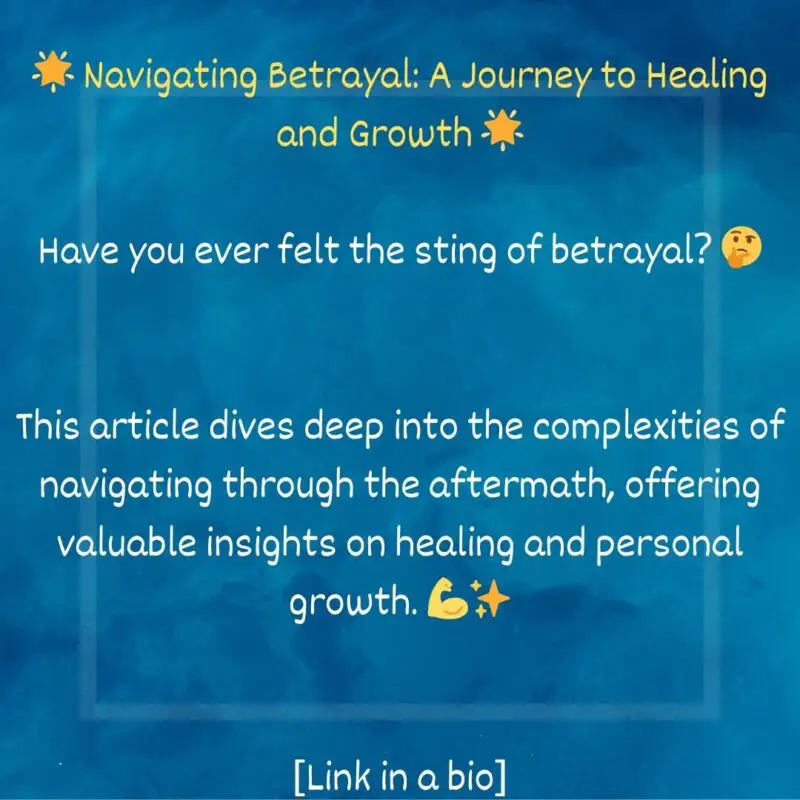-Strength Amidst Hurt
Betrayal by someone close can be a profound and painful experience, shaking the very foundations of trust and goodness. In the wake of such , finding a path forward requires courage, self-reflection, and a commitment to personal healing.

Navigating Betrayal: Ten Steps to Healing
In the aftermath, it’s essential to embark on a journey of healing and self-discovery. These ten steps provide a roadmap for navigating the complex emotions and challenges that accompany betrayal. From allowing yourself to feel to defining your narrative, each step offers guidance and support as you embark on the path towards healing and growth.
1. Allow Yourself to Feel:
Give yourself permission to experience the range of emotions that follow betrayal – hurt, anger, confusion. Suppressing these emotions can impede the healing process. Acknowledge your feelings and understand that they are a natural response to a challenging situation.
2. Establish Boundaries:
In the immediate aftermath of gossip, it’s crucial to set clear boundaries. This might involve creating emotional distance to protect yourself from further harm. Boundaries are an act of self-preservation and a way to regain a sense of control.
3. Seek Understanding:
While it may be difficult, seek understanding behind the gossip. This isn’t about justifying the actions but gaining insight into the circumstances and motivations. It can provide clarity and aid in the process of closure.
For further insights on dealing with betrayal and understanding the motives behind hurtful actions, you may find this article on understanding human behavior insightful: Link to the article.
4. Choose Self-Compassion:
Recognize that this gossip reflects the other person’s actions and choices, not your worth. Choose self-compassion over self-blame. Remind yourself that you deserve kindness and understanding during this challenging time.
5. Lean on Support Systems:
Share your feelings with trusted friends, family, or a therapist. Opening up to a support system can provide perspective, empathy, and a sense of connection. Surround yourself with those who uplift and encourage your healing journey.
6. Embrace Forgiveness (When Ready):
Forgiveness is a process, not an immediate decision. When you’re ready, consider forgiveness as a means of releasing the emotional burden. Forgiving doesn’t condone the actions but frees you from the weight of resentment.
7. Focus on Personal Growth:
Channel your energy into personal growth. Use this experience as an opportunity for self-discovery and self-improvement. Explore new interests, engage in activities that bring joy, and nurture your overall well-being.
8. Learn to Trust Again:
Rebuilding trust, whether with the same person or others, is a gradual process. Take small steps towards trusting again, ensuring that each step aligns with your comfort level. Trust is earned, and it’s okay to be cautious.
9. Reflect on Lessons Learned:
Reflect on the lessons learned from the experience. While painful, gossip can offer valuable insights into your own values, boundaries, and the nature of relationships. Use these lessons to inform healthier connections in the future.
10. Define Your Narrative:
Finally, reclaim your narrative. Don’t let the betrayal define you. Focus on the strength and resilience that emerge from overcoming adversity. Your story is one of growth, resilience, and the power to shape your own destiny.
Remember, healing is a gradual process, and there’s no fixed timeline for recovery. Be patient with yourself, prioritize self-care, and celebrate the strength you discover along the way.
Conclusion: Triumph Over Betrayal: Crafting Your Narrative of Resilience
As you journey through the aftermath of betrayal, remember that you hold the pen to your story. Despite the pain and turmoil, these ten steps empower you to reclaim your narrative and emerge stronger than before. By embracing self-compassion, seeking understanding, and focusing on personal growth, you can transform betrayal into a catalyst for resilience and personal empowerment. Your story is one of triumph over adversity, resilience, and the unwavering strength of the human spirit.
Do Follow for More Tips and Inspiration:
- Instagram: Follow us on Instagram
- Pinterest: Follow our Pinterest profile
FAQs
- How do I know if I’ve truly forgiven someone after experiencing betrayal?
- What steps can I take to establish healthy boundaries after betrayal?
- How can I navigate feelings of self-blame and low self-worth following betrayal?
- Is it normal to experience a range of emotions, including anger and sadness, after betrayal?
- How can I rebuild trust in others after experiencing betrayal in a previous relationship?
- What role does self-compassion play in the healing process after betrayal?
- Are there any warning signs that indicate I may need professional support to cope with betrayal?
- How can I differentiate between healthy introspection and dwelling on past betrayals?
- What strategies can I employ to focus on personal growth and resilience after betrayal?
- How do I prevent past betrayals from negatively impacting future relationships?
